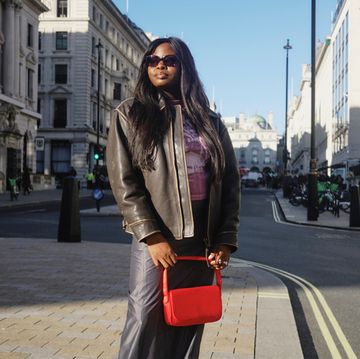By now, you’ve probably swapped everyday disposables for a reusable drinking bottle, bamboo cutlery, a tote bag and more. But how else can you stop contributing to carbon emissions and landfill?
From living hacks to sustainable beauty, there are even more ways to elevate your eco-friendliness this new year.
Car pollution is one of the major causes of global warming, thanks to the gases and solid matter emitted from car exhausts – so we’re all trying to limit our car journeys.
But, for those moments when taking public transport, cycling or walking aren’t ideal, use an UberPool. Not only will you cut your own costs, you’ll also cut your transport emissions (and greenhouse gases) in half.
Synthetic fabrics like polyester are extremely harmful to produce and to discard since they’re not biodegradable. They’re also the biggest source of microplastic pollution in oceans, since up to 1,900 fibres come off a garment every time you put it in the washing machine.
So it's worth investing in materials that contribute to a circular economy in the fashion industry. For example, pioneering REFIBRA™ technology by TENCEL™ upcycles a substantial proportion of cotton scraps (alongside wood pulp) to transform these raw materials into new TENCEL™ Lyocell fibres.
These botanic fibres are produced by environmentally responsible processes from the sustainably sourced natural raw material wood. The trees only need small amounts of water to thrive and don’t require any toxic pesticides, while the resulting biodegradable fibre is safer to dispose of than common fabrics, it also decreases the amount of waste we dump.
By buying clothes and brands that use natural fibres like TENCEL™ Lyocell fibres (which also happens to be super soft and extra breathable), you're feeding into a 'closed-loop' production process.
Lyocell fibres also don’t require bleach and have a high absorbency. The top line? It’s a natural material, made with a fraction of resources that deserves to be in your wardrobe repertoire ASAP.
Invest in a konjac sponge. These soft sponges are made of konnyaku, a perennial plant native to Asia, and are 100% natural vegetable fibre, completely compostable and biodegradable. The sponges last for around three months and are great for washing your face, with or without cleanser or soap. They are 97% water and naturally rich in minerals and antioxidants, as well as being alkaline – which promises to leave your skin calm and balanced.
On the surface, it may seem that online shopping is good for the environment: it means less car trips, right? However, the emissions from the masses of delivery vehicles in the road would say otherwise. And, this is before you even consider all the (recyclable) materials used to package the contents – or the environmental impact of free and flexible returns. So, instead, use click and collect when you shop online. This will help couriers consolidate their emissions, reducing congestion and traffic. Before you go on a spending spree, ask yourself if what you’re buying is really necessary. If you’re able to, always try an item on in a physical store, so you don’t have to order numerous sizes.
Did you know that domestic gas use in the home accounts for around 26% of most people’s carbon footprint? Switch to a green provider, such as Bulb, Tonik or Octopus, which uses 100% renewable energy collected from resources that naturally replenish, like sunlight, wind, rain, tides, waves, and geothermal heat. And be sure to switch off your devices at night – yes, that includes your Wi-Fi box – giving you the perfect excuse for that digital curfew.
Some companies, like Good Energy UK and Ecotricity, also have options where their biomethane gas is produced in the UK from organic matter (including manure and even sewage), while others have carbon-reduction schemes that support local communities in Malawi, Vietnam and Nepal. Do your research and make a small swap that’ll make a big difference.
We know it feels better to buy glass rather than plastic, but glass containers are only really better for the environment if you keep them, since glass production requires a lot of energy.
Could you decant something into it? Or use it as a water jug or even as a makeshift vase? Whatever you buy, try to ask yourself if you can reuse or upcycle it before throwing it into the recycling bin.
You may have already eschewed plastic fruit and vegetable bags for recycled and reusable drawstring bags, but why not take this one step further by shopping local? This means going to nearby farmers’ markets that encourage in-season produce and don’t tend to sell things that have had to travel from far away. Or, you could try to find your closest plastic-free supermarket.
Empower yourself today and realise the influence you have on our world through the power of your pound. Every spend is a vote – remember that.
Embrace a circular economy and make your wardrobe more sustainable with TENCEL™ branded fibres that are already in some of your favourite brands





















